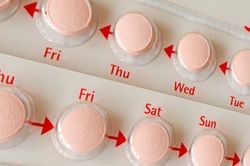How Hormonal Contraceptive Pills Affect Mood

From IUDs to tubal ligation, there are many safe and effective ways that gynecologists can help women control reproductive capabilities. Of all these options, hormonal birth control pills remain the top form of impermanent contraception among females. In addition to significantly reducing the likelihood of pregnancy, these medications offer several benefits, including lighter periods, minimized menstrual cramps, and reduced acne. Despite these advantages, however, many worry that the hormonal changes of the pill may negatively impact their mood. Here’s a basic guide to the emotional effects of oral contraception.
How Do Hormonal Birth Control Medications Work?
There are two main types of oral birth control: combined and progestin-only pills.
Combined oral contraceptives contain both estrogen and progestin. Users take an active pill—one that includes hormones—for 21 days out of the month. During the remaining week, they take inactive pills that don’t contain hormones.
When taken as prescribed by a gynecologist, combined pills increase estrogen and progestin hormones in the body to stop the ovaries from releasing eggs. As an additional line of protection, this medication thickens cervical mucus to restrict the likelihood of sperm reaching an egg.
Women who cannot take estrogen may opt for the progestin-only medication, commonly known as the “mini-pill.” This synthetic form of progesterone works primarily by thickening cervical mucus and thinning the uterus lining to prevent sperm from reaching an egg. This medication may also prevent the release of eggs, but not as efficiently as the combined option.
One course of progestin-only medication contains 28 active pills that contain hormones. These pills must be taken every day within the same three-hour window.
What Effects Can Hormonal Birth Control Have on Mood?
 Without oral contraception, women experience a natural rise and fall in estrogen and progesterone during menstrual cycles. These fluctuations can trigger a varying degree of mood swings. With oral birth control, these fluctuations aren’t as severe. As a result, users may experience a variety of emotional side effects.
Without oral contraception, women experience a natural rise and fall in estrogen and progesterone during menstrual cycles. These fluctuations can trigger a varying degree of mood swings. With oral birth control, these fluctuations aren’t as severe. As a result, users may experience a variety of emotional side effects.
While the mechanisms are not completely clear, some studies have shown that women taking oral contraceptives showed a reduced likelihood of depression and improved mood. This is likely due to increased serotonin production triggered by heightened levels of estrogen.
While not as likely, research also suggests that some women may experience more depressive symptoms after taking birth control pills—especially if they have a history of depression. For many others, the consistent stability of hormone levels prevents mood swings.
If you’re curious about your options for contraception—including hormonal birth control—Dr. William M. Jamieson, MD, will provide the insight you need. Well-versed in birth control methods and fertility issues, this Cincinnati, OH, gynecologist will review the pros and cons of your options. Dr. Jamieson can also provide hormone testing to help determine which treatments are optimal for your mental health profile. Visit this women’s health center online for more details about these services, or call (513) 241-7744 to schedule an appointment.
About the Business
Have a question? Ask the experts!
Send your question

